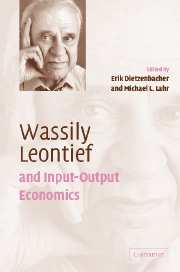Book contents
- Frontmatter
- Contents
- List of contributors
- List of figures
- List of tables
- Preface
- Part I Reflections on input-output economics
- Part II Perspectives of input-output economics
- 10 A neoclassical analysis of total factor productivity using input-output prices
- 11 What has happened to the Leontief Paradox?
- 12 The decline in labor compensation's share of GDP: a structural decomposition analysis for the United States, 1982 to 1997
- 13 An oligopoly model in a Leontief framework
- 14 Economies of plant scale and structural change
- 15 Technological change and accumulated capital: a dynamic decomposition of Japan's growth
- 16 Japan's economic growth and policy-making in the context of input-output models
- 17 Contributions of input-output analysis to the understanding of technological change: the information sector in the United States
- 18 How much can investment change trade patterns? An application of dynamic input-output models linked by international trade to an Italian policy question
- 19 Social cost in the Leontief environmental model: rules and limits to policy
- Subject index
- Author index
10 - A neoclassical analysis of total factor productivity using input-output prices
Published online by Cambridge University Press: 22 September 2009
- Frontmatter
- Contents
- List of contributors
- List of figures
- List of tables
- Preface
- Part I Reflections on input-output economics
- Part II Perspectives of input-output economics
- 10 A neoclassical analysis of total factor productivity using input-output prices
- 11 What has happened to the Leontief Paradox?
- 12 The decline in labor compensation's share of GDP: a structural decomposition analysis for the United States, 1982 to 1997
- 13 An oligopoly model in a Leontief framework
- 14 Economies of plant scale and structural change
- 15 Technological change and accumulated capital: a dynamic decomposition of Japan's growth
- 16 Japan's economic growth and policy-making in the context of input-output models
- 17 Contributions of input-output analysis to the understanding of technological change: the information sector in the United States
- 18 How much can investment change trade patterns? An application of dynamic input-output models linked by international trade to an Italian policy question
- 19 Social cost in the Leontief environmental model: rules and limits to policy
- Subject index
- Author index
Summary
Introduction
During one of our very last discussions Wassily Leontief asked me: “What are you doing these days?” I replied that I reconcile input-output analysis and neoclassical economics. He leant back, thought, looked me straight in the eyes, and said: “Should be easy.”
Yet input-output analysis and neoclassical economics seem hard to mix. The resentment between the two schools of economics is a two-way affair. Neoclassical economists consider input-output analysis a futile exercise in central planning. The relationship between the delivery of a bill of final goods and its requirements in terms of gross output and factor inputs is considered mechanical, with little or no attention paid to the role of the price mechanism in the choice of techniques (Leontief, 1941). True, input-output analysis is used to relate prices to factor costs, but here too the analysis is considered mechanical as input-output coefficients are presumed to be fixed. To make things worse, the quantity and value analyses are perceived to be disjunct, with no interaction between supply and demand.
Conversely, input-output economists consider neoclassical economics a futile exercise in marginal analysis that fails to grasp the underlying structure of the economy. Firms supply up to the point that marginal revenue equals marginal cost and set the price accordingly. But does not marginal cost depend on all prices in the system, including the one of the product under consideration? And if the answer is yes, should not we take into account the interindustry relations, i.e. apply input-output analysis?
Information
- Type
- Chapter
- Information
- Wassily Leontief and Input-Output Economics , pp. 151 - 165Publisher: Cambridge University PressPrint publication year: 2004
Accessibility standard: Unknown
Why this information is here
This section outlines the accessibility features of this content - including support for screen readers, full keyboard navigation and high-contrast display options. This may not be relevant for you.Accessibility Information
- 2
- Cited by
